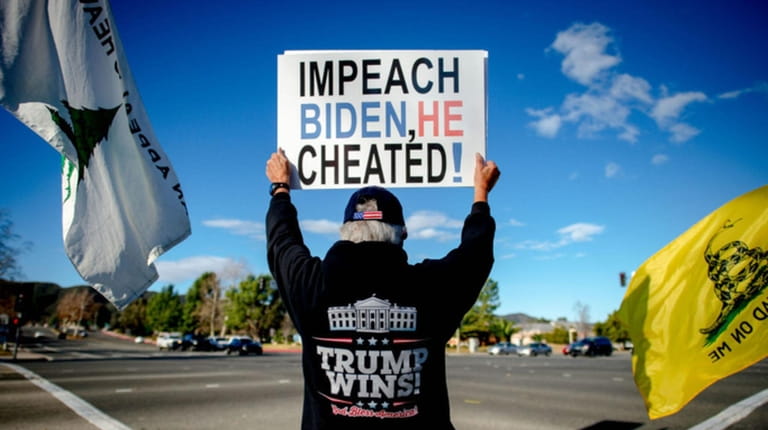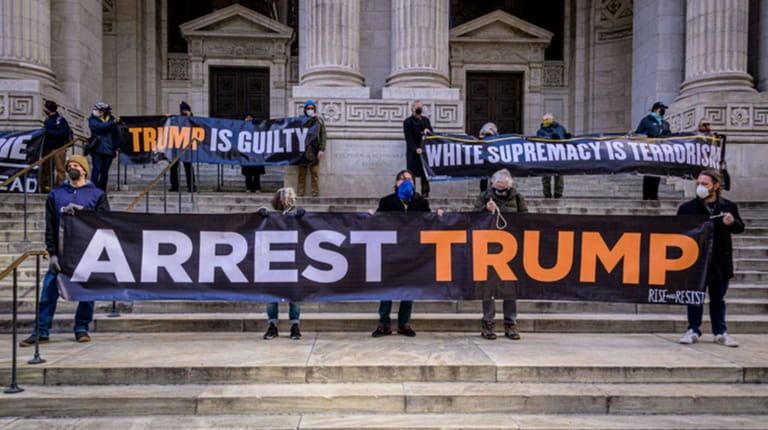We can collaborate again

Supporters celebrate Dwight Eisenhower's victory in the 1952 presidential election, with the popular "I Like Ike" slogan. Credit: Gamma-Keystone via Getty Images/Keystone-France
As part of the Siena College Research Institute’s American Values Survey conducted this spring, one respondent said, "There's no middle … If you believe in conservative ideas and you (also) believe some progressive ideas, your own party or your own people will bash you … The same from the left side. If you express some conservative ideologies, (and) you want to be in the middle, they will bash you."
This response is illustrative of our findings: that our country is profoundly divided and civility is on the decline. However, the results of this study also shockingly reveal a strong alignment of shared values. Contrary to conventional wisdom, common principles still tie us together and provide the foundation for pulling our country back together and striving forward.

A Trump supporter holds an anti-Biden sign at a rally in Temecula, California, on Jan. 20, during the inauguration of Joe Biden as the 46th president of the United States. Credit: MediaNews Group/The Press-Enterprise via Getty Images/Watchara Phomicinda
Within this representative study of more than 6,000 Americans who voted in 2020, 51% voted for Joe Biden while 47% voted for Donald Trump (matching the 2020 popular vote totals). Thirty-one percent say the election was stolen from Trump while 56% think it was not. Half say much of the mainstream media is fake news, while 36% do not.

Activists from the group Rise and Resist gather at the steps of the New York Public Library at the reading of impeachable crimes attributed to President Donald Trump on Jan. 19. Credit: LightRocket via Getty Images/Erik McGregor
The ideological divide in our country is evident. However, this story is as old as our nation. It is easy to forget that the United States was formed by uniting 13 very diverse states in a tenuous political marriage. After surviving 245 years together — including one attempt to dissolve the union that resulted in the Civil War — we could be headed toward divorce if we continue on our current path. Encouragingly, though, we found in the American Values Survey, that respondents from all 50 states — despite differing views on key issues — harmonize like a choir in wholeheartedly insisting that they are guided by core values of liberty, equality and progress.
Respondents from across the political spectrum in this scientifically conducted survey rated themselves highly and consistently in adhering to the core tenets of our Constitution, Declaration of Independence, and what philosophers sometimes call American common-sense realism. The ratings for both Biden and Trump voters averaged 80 on a scale of 0 to 100.
The research findings point to the need for principled leadership and decisive legislative action now, so that our social fabric and our faith in our ability to be self-governing can be restored. In this moment, we must boldly engage in reform that will honor and strengthen our union by following the guidance of our Founders.
Our Constitution incorporates checks and balances and auxiliary measures to safeguard against the centralization of power. Our Founders intentionally made political change possible, but challenging and time-consuming, in an effort to protect liberty and force compromise. For change to occur, competing factions would have to work together. History reminds us: We have succeeded when our government has faced moments of acute struggle. We have also faltered.
Two periods, in particular, are instructive. In the 1850s, our political leaders utterly failed the country and a bloody Civil War resulted. However, in the 1950s, when the country once again faced major political and ideological divides and the rise of extremism, artful presidential and congressional leadership rose to the moment. We stepped back from catastrophe and enjoyed massive economic growth and the expansion of the middle class. Seizing the opportunity following the 1954 Supreme Court decision Brown v. Board of Education, the Eisenhower administration subsequently worked across party lines with Congress to enact the Civil Rights Act of 1957, which helped set the stage for the much more significant Civil Rights Act of 1964 and Voting Rights Act of 1965.
The results of the AVS provide hope that our nation can return to this level of collaboration and compromise, but we must not delay in taking decisive action to realize this potential.
First, we should build on the bipartisan work already taking place in Congress in the shadow of the partisan conflict that captures all the attention. The recent United States Innovation and Competition Act and the current bipartisan infrastructure bill are good examples.
Second, we must reverse the concerning trend toward centralization of power by repairing the separation of powers that has been weakened over the past century by the rise of what many political scientists describe as the "imperial presidency." Structural reform is necessary to once again encourage collaboration.
We support the following proposals:
- Independent redistricting to help send to Washington legislators who more closely represent the views of America. Partisan redistricting has exacerbated the divides in Washington and made collaboration almost impossible. Voters should choose their representatives, not the other way around.
- Legislation that reinforces the separation of powers, like the War Powers Reform Act, to ensure legislators vote before the president sends troops to war. We will need more legislation like that to restore the power of Congress.
- National service initiatives to help strengthen our bonds of citizenship and national unity. The shared sacrifice of past crises brought Americans together in common purpose and we need more of that now.
- Crucially, we also need renewed emphasis on civics education. Although the Founders disagreed on a number of highly contentious issues, they all agreed that an educated and informed citizenry, capable of critical, independent thinking, was essential to the viability of our Republic.
The American Values Survey provides hope that our shared values of liberty, equality, and progress can help provide the common language we need to save the United States and experience our best century yet.
This guest essay reflects the views of Chris Gibson, president of Siena College and a former Republican member of the U.S. House of Representatives, and former Democratic Rep. Daniel Lipinski, who now writes and consults at Lipinski Solutions.
